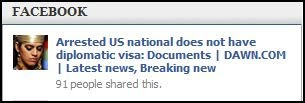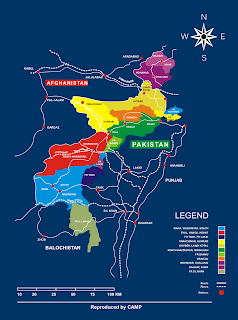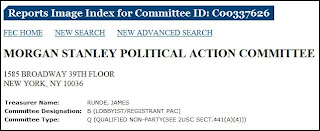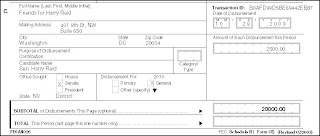This is very peculiar.
I wasn't going to blog for a few more days. I have been online, and I have been updating the links in the sidebar, adding in regional news sources as we get ready to begin our Presidential primary season (yes, it's that time again - the Presidential elections last longer and longer, and cost more and more...).
But, as I came online again, I noticed an article I had read earlier, which was widely shared on Facebook, has magically disappeared. The article dealt with the lack of diplomatic credentials for an American accused of murder in Lahore, Pakistan.
Basically, what happened is that this guy was in the wrong part of Lahore, without security escort (as would be expected to accompany someone there working for the Consulate), and got into a problem. He supposedly shot two Pakistanis, claiming self-defense. Another Pakistani was run over by an unidentified vehicle coming to pick this guy up and extricate him from the area, but then that car disappeared.
From The (Very) Strange Case of Raymond Davis, January 30, 2011:
Now, the one page showing that the accused, Davis, did not have a diplomatic visa, is missing, but there is another with similar information:
I reviewed my previous posts, including The Land of the Pure, Part 6, and The Colonel Imam Situation, and decided to begin a new series on Pakistan.
From US Embassy Personnel Caught Spying On Kahuta, January 29, 2011:
It seems American contractors in another part of Pakistan are sniffing around a Pakistani nuclear facility. The commandant of the police training facility where these contractors are supposedly working got suspicious, and asked a few questions.
Okay, so we have some American "contractors" doing what is presumably their job, collecting intelligence on Pakistan's nuclear program, and a Pakistani police academy commandant doing his, reporting the Americans.
Skipping down, the article summarizes what is going on:
Some of what we're seeing here is American intelligence personnel mixed in with contractors, which the US Government has been increasingly using instead of US Government personnel.
But what else we are seeing is the Pakistani Deep State, which is involved in nuclear proliferation for profit, heroin smuggling, and other lucrative activities, as well as support for Islamic terrorism, battling other factions of Pakistan's elite.
On the US side, we see the US Deep State, involved in similar illicit activities for profit.
And, we see legitimate and semi-legitimate functions of the US Government to ensure people friendly to US interests emerge on top in Pakistan's power struggle, and to make sure Washington has information regarding issues of concern to US national security.
So, mixed into this mess, we have American intelligence personnel in semi-official and non-official cover; but, are they working for the interests of the US, or are they involved in illicit activities using their connections to the intelligence community as a layer of cover under the cover established for them by the intelligence community, but above the real mission of trafficking narcotics and other contraband? Is that trafficking just for profit, or does it fund other covert/clandestine activities, so Congressional oversight is avoided by not taking money from our Congresscritters?
Do we know who all these guys are really working for?
It is apparent someone in Islamabad thinks he knows who they all are working for, and is facilitating the work of some, but not of others.
Meanwhile, Colonel Imam has reportedly been killed (dated January 24, 2011).
The War on Terror will be decided mainly in Pakistan.
A major battle in the War on Drugs will also be decided there, as, until the War on Terror in Afghanistan is ended, the instability there will foment trafficking of high-quality heroin as Afghanistan essentially corners the world market for both quality and quantity.
And, there is profiteering and the Great Game going on.
All of this fuels corruption in Rawalpindi and Islamabad and, of course, in London and especially in Washington.
There is a covert fight occuring to decide Pakistan's future, and even Pakistan's existence as a sovereign nation.
I wasn't going to blog for a few more days. I have been online, and I have been updating the links in the sidebar, adding in regional news sources as we get ready to begin our Presidential primary season (yes, it's that time again - the Presidential elections last longer and longer, and cost more and more...).
But, as I came online again, I noticed an article I had read earlier, which was widely shared on Facebook, has magically disappeared. The article dealt with the lack of diplomatic credentials for an American accused of murder in Lahore, Pakistan.
Basically, what happened is that this guy was in the wrong part of Lahore, without security escort (as would be expected to accompany someone there working for the Consulate), and got into a problem. He supposedly shot two Pakistanis, claiming self-defense. Another Pakistani was run over by an unidentified vehicle coming to pick this guy up and extricate him from the area, but then that car disappeared.
From The (Very) Strange Case of Raymond Davis, January 30, 2011:
[W]hat exactly was happening at Mozang? Very much in line with the immediate knee-jerk reaction of many Pakistanis, an early commentary by Jeff Stein in The Washington Post seemed to suggest rather fancifully that the shootout could have been a "Spy rendezvous gone bad?" That would be a conspiracy theory, but not an entirely implausible one. Mozang is not a part of town that you would expect too many foreigners, let alone a US official, visiting; and certainly not in what was reportedly a rented private vehicle. And while Pakistan today is clearly an unsafe place, the question of just why an Embassy official was carrying a firearm be wished away. On the other hand, however, Mr. Davis claims that he shot in self defense as the two men on the motorcycle were trying to rob him at gun point. Anyone who knows Pakistan knows all too well that this, too, is entirely possible. TV footage and reports coming immediately after the incident showed one of the young men lying dead with a revolver and wearing an ammunition belt. And certainly, the question of why at least one of the two young men on the motorcycle was carrying a loaded firearm cannot be wished away just because he had "dushmani." Indeed, serious questions need to be asked about just who the two young men on the motorcycle were, just as they need to be asked about who Raymond Davis is. There just seem to be too many unnecessary weapons in too much proximity in this story. All of the many explanations that are floating around are very disturbing, but also very plausible. Which is exactly why this story is even more dangerous if left unresolved.
Now, the one page showing that the accused, Davis, did not have a diplomatic visa, is missing, but there is another with similar information:
LAHORE: Deputy Prosecutor General of Punjab, Rana Bakhtiar said on Sunday that Raymond Davis had fired the bullets from the back thus it was not a case of 'self defense' as he had stated earlier.
Rana also said that Davis, charged with murder of two motorcyclists in Lahore, did not hold any special privileges as a diplomat.
Referring to Article 49-2 of the Vienna Convention, he said that diplomatic officials only hold privilege when they are on duty, but Davis was in Pakistan on a business visa.
Davis is being described by the American media as a security contractor from a Florida-based firm, Hyperion Protective Consultants, LLC.
That Foreign Office and the US embassy were not on the same page on the issue of status of the accused was obvious from an FO press release that mentioned Davis as a US 'functionary', and not a diplomat.
I reviewed my previous posts, including The Land of the Pure, Part 6, and The Colonel Imam Situation, and decided to begin a new series on Pakistan.
From US Embassy Personnel Caught Spying On Kahuta, January 29, 2011:
Pakistani authorities have enough evidence that implicates US diplomats and trainers in spying on Kahuta, one of the prime nuclear facilities in the country.
What is stunning for most Pakistanis is that elements in the elected government, and especially the Interior Ministry, appear to be facilitating the Americans despite protests from police and intelligence officials.
It seems American contractors in another part of Pakistan are sniffing around a Pakistani nuclear facility. The commandant of the police training facility where these contractors are supposedly working got suspicious, and asked a few questions.
The Commandant Police Training College Sihala, Mr. Nasir Khan Durrani, wrote a letter on Aug. 15 to senior Pakistani police officers drawing their attention to the suspicious activities of American 'trainers' at Sihala. Mr. Durrani is widely respected within the officer corps of Pakistan's police service. Some of his ideas, like Rescue 15, were implemented nationwide.
Durrani's letter was not without basis. In his report, titled, Agency wants survey of site to assess equipment, Mr. Ansar Abbasi, editor investigations at The News International, revealed that there was some evidence that radiation measurement equipment has been installed by the Americans at the training facility. He reported that US diplomats have been caught making frequent visits to the facility, attempting at one point to get into the high security perimeter around Kahuta. Amazingly, someone from FIA, the interior minister's former employer and a lead civilian spy agency, helped release the arrested American diplomats.
Okay, so we have some American "contractors" doing what is presumably their job, collecting intelligence on Pakistan's nuclear program, and a Pakistani police academy commandant doing his, reporting the Americans.
The suspicions of Mr. Durrani, Commandant Police Training College Sihala, turn out to be legitimate. Mr. Durrani might have expected to be rewarded for keeping a vigil on the country's vital interests. To his surprise, instead of a citation, Mr. Durrani was reprimanded by the Federal Interior Ministry.
On Oct. 22, The Nation published a report whose title, Rehman Malik Defends US interests, warns Durrani, said it all.
"The Interior Ministry is browbeating the Commandant Police Training College Sihala as to why he has written a letter to the Punjab, Inspector General of Police (IGP), expressing his concerns over the presence of US security officials in the premises of the institute," the sources told TheNation.
Sources privy to the developments said that the Ministry was annoyed with Nasir Khan Durrani, Commandant Police Training College Sihala as to why he had written a letter to IGP seeking clarification from the Interior Ministry and Foreign Office about the terms and conditions of US security officials' presence as well as the duration of their stay in the college premises.
The sources said that the Ministry had expressed its displeasure over the action of Commandant and in its reply to the IGP it was stated that the matter could have been discussed verbally and there was no need to write about it.
Skipping down, the article summarizes what is going on:
Evidence is piling up that the present 'elected' government in Islamabad is racing against time to plant enough Americans inside Pakistan to counter the Pakistani military and the country's strong intelligence setup.
Some of what we're seeing here is American intelligence personnel mixed in with contractors, which the US Government has been increasingly using instead of US Government personnel.
But what else we are seeing is the Pakistani Deep State, which is involved in nuclear proliferation for profit, heroin smuggling, and other lucrative activities, as well as support for Islamic terrorism, battling other factions of Pakistan's elite.
On the US side, we see the US Deep State, involved in similar illicit activities for profit.
And, we see legitimate and semi-legitimate functions of the US Government to ensure people friendly to US interests emerge on top in Pakistan's power struggle, and to make sure Washington has information regarding issues of concern to US national security.
So, mixed into this mess, we have American intelligence personnel in semi-official and non-official cover; but, are they working for the interests of the US, or are they involved in illicit activities using their connections to the intelligence community as a layer of cover under the cover established for them by the intelligence community, but above the real mission of trafficking narcotics and other contraband? Is that trafficking just for profit, or does it fund other covert/clandestine activities, so Congressional oversight is avoided by not taking money from our Congresscritters?
Do we know who all these guys are really working for?
It is apparent someone in Islamabad thinks he knows who they all are working for, and is facilitating the work of some, but not of others.
Meanwhile, Colonel Imam has reportedly been killed (dated January 24, 2011).
ISLAMABAD:
A former officer of the Inter-Services Intelligence (ISI) Sultan Amir Tarar, better known as Colonel Imam, has reportedly been killed by the Taliban on Sunday.
Though there is no official confirmation of his death, sources close to his family say they were informed about Col Imam's killing by intelligence sources.
The War on Terror will be decided mainly in Pakistan.
A major battle in the War on Drugs will also be decided there, as, until the War on Terror in Afghanistan is ended, the instability there will foment trafficking of high-quality heroin as Afghanistan essentially corners the world market for both quality and quantity.
And, there is profiteering and the Great Game going on.
All of this fuels corruption in Rawalpindi and Islamabad and, of course, in London and especially in Washington.
There is a covert fight occuring to decide Pakistan's future, and even Pakistan's existence as a sovereign nation.




















































